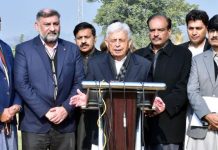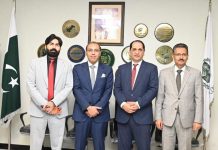ISLAMABAD, OCT 7 /DNA/ – The business community serves as the linchpin of a country’s economy, driving growth, innovation, and job creation. To ensure economic stability, it is crucial to provide facilities and resources that enable businesses to operate efficiently. Rather than employing high-handed tactics to boost tax collection, policymakers should prioritize ease of doing business. By streamlining procedures and fostering a supportive environment, businesses can thrive, contributing to the nation’s economic wellbeing and prosperity.
This has been stated by Nasir Mansoor Qureshi, while talking to different delegations of business leaders who called on him to felicitate him on assuming the office of Islamabad Chamber of Commerce and Industry President.
He emphasized the importance of a collaborative approach to boost tax collection, highlighting that the only effective way to achieve this is through a meaningful consultative process with stakeholders from the business, industry, and trade community. This approach is crucial in broadening the tax base, simplifying the taxation system.
The ICCI President referred to the Federation of Pakistan Chamber of Commerce and Industry President Atif Ikram Shaikh’s statement that “FBR’s revised tax collection target of Rs. 12.91 trillion for the fiscal year 2024–25 is not only unrealistic; but also regressive and anti-business. Because, in the current state of the economy, with no opportunities for businesses to expand, the shortfall in FBR’s tax collection will continue to spiral out of control as the July–August 2025 shortfall is Rs. 99 billion, and September 2024 deficit is expected to be between Rs. 100–150 billion”.
Nasir Qureshi emphasized the need for the Ministry of Finance and the Federal Board of Revenue (FBR) to conduct a thorough analysis of the underlying reasons for missing tax collection targets. To revitalize the economy, the government must take concrete measures, including export facilitation, renegotiation of power purchase agreements with independent power producers, and reducing key policy rates to single digits to align with prevailing core inflation. Additionally, rationalizing power and gas tariffs will make energy more affordable, while improving law and order will foster a secure business environment. By addressing these critical areas, the government can create a business-friendly ecosystem, boost tax revenue, and drive economic stability in Pakistan.
He concluded by stressing that broadening the tax base should be achieved through simplification of the taxation system, rather than perpetuating maladministration or disregarding stakeholder consultation. This approach is crucial for Micro, Small, and Medium Enterprises (MSMEs), which require special governmental support to join the tax net. By incentivizing and enabling their growth, MSMEs can contribute significantly to the economy.

















